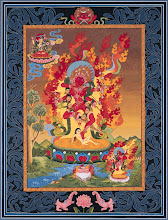Saturday, July 11, 2009
Uighurstan Power Plays
Friday, July 10, 2009
Uncle Zhou in Uighurstan
“Hai-er-ni-sha-han, a 66 year-old Uighur woman who had been struck in the head with a brick while riding on a public bus, is currently receiving medical treatment. Zhou Yong-kang visited her bedside, and leant over to carefully examine her wounds. He expressed his personal sympathies to her. Hai-er-ni-sha-han said that she has confident in the party and the government, believes that the malevolent goals of villains will not succeed, and that ‘our lives will be sure to improve.’ Zhou Yong-kang said to her: ‘You have indeed spoken well. What you said represents the common aspirations of the people of all ethnic groups in Xinjiang.’”
Thursday, July 9, 2009
Neo-colonialism with Chinese characteristics
For them, all minorities are fully — and only — Chinese citizens, and therefore must be loyal to the government and grateful for its largesse. There will never be much gratitude unless China’s leaders grant these groups real regional autonomy, guarantee freedom of religion, curb Han Chinese migration and stop their insulting rhetoric about underdeveloped minorities in need of help. But they won’t. So the unrest and discontent — at times exploding into the violence of the past few days — are bound to continue.He also does a good job of explaining the difference between ethnic "nationalities" such as Tibetans and Uighurs, vice the 50+ other minority groups in China - i.e. Hui, Zhang, etc. - a distinction that is frequently obscured by both Chinese leaders and others in making comparisons to ethnic politics in other countries, as well as comparisons among ethnic groups within China.
Wednesday, July 8, 2009
Uighur Protests continue
The recent Uighur repression has taken on a racial tone. The Chinese government is known for encouraging a nationalistic streak among Han Chinese as it seeks to replace the bankrupt communist ideology it used to promote. This nationalism was in evidence as the Han Chinese mob attacked Uighur workers in Shaoguan. This official encouragement of reactionary nationalism among Han Chinese makes the path forward very difficult.As the violence escalates, so does the pain I feel for the loss of all innocent lives. I fear the Chinese government will not experience this pain as it reports on its version of events in Urumqi. It is this lack of self-examination that further divides Han Chinese and Uighurs.
Tuesday, July 7, 2009
Seriously?!? Are these people crazy or just evil?
Meanwhile, for much of the afternoon, a mob of 1,000 mostly young Han Chinese holding cleavers and clubs and chanting "Defend the Country" tore through streets trying to get to a Uighur neighborhood until they were repulsed by police firing tear gas.
Panic and anger bubbled up amid the suspicion in Urumqi (pronounced uh-ROOM-chee). In some neighborhoods, Han Chinese — China's majority ethnic group — armed themselves with pieces of lumber and shovels to defend themselves. People bought up bottled water out of fear, as one resident said, that "the Uighurs might poison the water."
The outbursts happened despite swarms of paramilitary and riot police enforcing a dragnet that state media said led to the arrest more than 1,400 participants in Sunday's riot, the worst ethnic violence in the often tense region in decades.
Trying to control the message, the government has slowed mobile phone and Internet services, blocked Twitter — whose servers are overseas — and censored Chinese social networking and news sites and accused Uighurs living in exile of inciting Sunday's riot. State media coverage, however, carried graphic footage and pictures of the unrest _showing mainly Han Chinese victims and stoking the anger.
China: The revolution will be spun
Hours after troops quelled the protests, in which 156 people were reported killed, the state invited foreign journalists on an official trip to Urumqi, Xinjiang’s capital and the site of the unrest, “to know better about the riots.” Indeed, it set up a media center at a downtown hotel — with a hefty discount on rooms — to keep arriving reporters abreast of events.It is a far cry from Beijing’s reaction 11 years ago to ethnic violence elsewhere in Xinjiang, when officials sealed off an entire city and refused to say what happened or how many people had died. And it reflects lessons learned from the military crackdown in Tibet 17 months ago. Foreign reporters were banned from Tibet, then and now. Chinese authorities rallied domestic support by blaming outside agitators but were widely condemned overseas.State television has focused primarily, though not totally, on scenes of violence directed against China’s ethnic Han majority. Chinese news Web sites carry official accounts of the unrest, but readers are generally blocked from posting comments.
As in Tibet, blame for the violence has been aimed at outside agitators bent on splitting China — in this case, the World Uighur Congress, an exile group whose president, Rebiya Kadeer, is a Uighur businesswoman now living in Washington.




